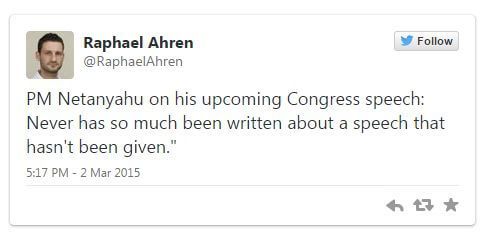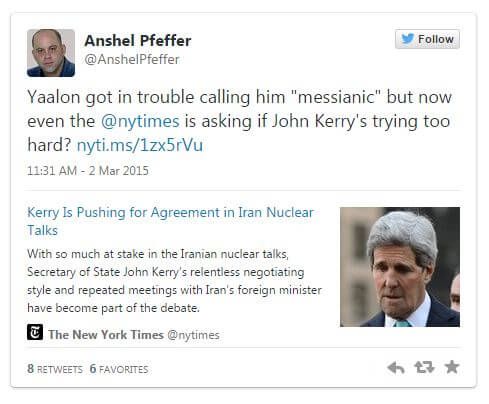Today’s Top Stories
1. On the day before Prime Minister Netanyahu’s speech to Congress, interest and discussion has reached a fevered pitch. Demand for tickets is off the charts — “10 times as many requests as there are seats available,” Politico reports.
Today, the prime minister addressed the AIPAC conference — a brief warm up for the main event tomorrow. Ambassador Samantha Power also spoke. (Also due to speak after this roundup was published was US National Security Advisor Susan Rice.)
There’s a mother lode of commentaries weighing in and debating everything possible about the speech. If you want to skip ahead to see who said what, click here.
2. The Egyptian government gave the military authorization to strike Gaza. That’s according to Egyptian media reports picked up by Israel HaYom, which qualifies:
Senior Egyptian officials believe the likelihood of an Egyptian military attack in Gaza is slim, and that the decision was likely made as a deterrent measure and to hint that the military option is on the table in light of Hamas involvement in terrorist attacks in Egypt.
3. With all the bad blood between Hamas and Egypt, Islamic Jihad has become an unlikely broker between the two. According to Haaretz:
It should be noted that relations between Islamic Jihad and Egypt improved for the most part following last summer’s fighting, as well as during the war, due to the flexibility that the organization’s representatives demonstrated over indirect talks with Israel on a cease-fire.
4. A Case of Cultural Vandalism Against Israel: What’s even worse than a cultural boycott of Israel?
5. The Guardian Electrifies Israeli Security Barrier: Electronic, yes, electrified, no.
6. The Independent’s Hypocritical Critique of Madonna: Since when is living in Europe a prerequisite for speaking out against the continent’s anti-Semitism?
Iranian Atomic Urgency
• Obama to veto bill letting Congress weigh in on Iran
• The White House offered a rebuttal to Netanyahu’s speech before the prime minister even arrived in Washington. And the New York Times notes coming attractions from Pennsylvania Ave.
The president has scheduled an interview with Reuters for Monday afternoon, the same day that Susan E. Rice, his national security adviser, and Samantha Power, his ambassador to the United Nations, will address the American Israel Public Affairs Committee at its policy conference here.
• The White House denied Arab media reports that President Obama once threatened to shoot down Israeli jets headed towards Iran.
Israel and the Palestinians
• Hillel Neuer blows the lid on the faceless UN officials who really wrote the Goldstone report on 2009. It’s a case study on why the upcoming Schabas report will be just as biased.
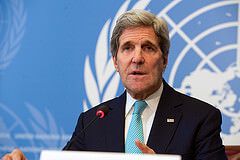
• John Kerry addressed the UN Human Rights Council (full transcript here) slamming the body’s “unbalanced focus” on Israel. AP writes:
In a speech denouncing rights abuses in places like Syria, North Korea and Ukraine, Kerry spent several minutes on what he called the council’s “deeply concerning record on Israel.”
“No one in this room can deny that there is an unbalanced focus on one democratic country,” he said, decrying the fact that no country other than Israel has a permanent agenda item on the council’s schedule. “It must be said the (council’s) obsession with Israel actually risks undermining the credibility of the entire organization.”
• Three Israeli nationals were arrested for smuggling material to Hamas used for making weapons and digging tunnels, reports Haaretz.
Raids uncovered large amounts of illegal materials, some of which was hidden among materials permitted for entry into Gaza.
• The International Olympic Committee is taking new steps to mourn the dead during the 2016 Rio games. Hard to say if this will satisfy Israelis. AP writes:
Under measures that will go into effect at next year’s games in Rio de Janeiro, a special area will be set up in the Olympic Village for athletes to mourn the loss of family or friends, and a “moment of reflection” will be observed during the closing ceremony to remember those who have died during any games.
The moves were approved by the IOC executive board after Olympic leaders faced criticism for refusing a moment of silence for the Israeli victims during the opening of the 2012 London Games, and for preventing athletes from wearing black armbands during competition in tribute to deceased friends, relatives or fellow competitors.

• An international forum for TV production companies to pitch their shows ground to a halt when Arab judges refused to hear an Israeli company’s presentation.
Assaf Gil, chairman of Gil Productions, told C21 Media he had “never seen anything like it” during his 25-year career.
“It was incredible to think that a pitching session was cancelled because the judges didn’t want to listen to Israeli pitches,” he said. “Politics doesn’t come into the television industry.”
More on the story at the Hollywood Reporter.
Around the World
• The European Jewish Press reports that Muslims in the Belgian town of Arlon are showing their solidarity with the Jewish community by raising money to rehabilitate the country’s oldest synagogue.
• After losing ground and men to the Nusra Front, US-backed Syrian rebel group dissolved itself. Reuters says the men of Hazzm are joining an alliance of Islamist brigades in Aleppo “to prevent further bloodshed.”
• Egypt plans to construct a new capital city at a cost of $80 billion. The so-far-unnamed city will be built east of Cairo, near the Suez Canal, at a cost $80 billion. I wish Egypt the best, but also sounds like boondoggle of corruption waiting to
Media Matters
 • Fascinating article in the Wall St. Journal (click via Google News) about the way Big Media uses and abuses video footage taken in combat zones. The rules for attribution with video aren’t as strict as with still photography.
• Fascinating article in the Wall St. Journal (click via Google News) about the way Big Media uses and abuses video footage taken in combat zones. The rules for attribution with video aren’t as strict as with still photography.
The resulting widespread and unattributed use of agency material can be misleading to the viewer in varying degrees. The best broadcast correspondents use agency war coverage only if, on the day, that footage is better or more dramatic than the video they were able to shoot on the ground themselves. Many acknowledge their debt to the agencies, as Peter Arnett did after his memorable coverage of the first Gulf War from Baghdad.
Other TV journalists report conflicts from the relative safety of their hotel and rely heavily on agency “bang bang,” as combat video is sometimes called in the field. The drama of the agency coverage often lends gravitas to a broadcast journalist’s stand-up, or “piece to camera,” which is sometimes delivered wearing a flak jacket within the hotel compound. (On occasion, not far from the bar.)
• Photography: Telling Art From Fraud
This year’s World Press Photo awards saw an unprecedented number of entrants thrown out for tampering with their images – reopening an old debate on what can be a fine line, in photojournalism, between artistry and fraud.
Commentary/Analysis
• Of all the commentaries I saw on The Speech, the nuance of David Harsanyi’s Columbus Dispatch op-ed was closest to my own head-space. And Leon Hadar took a step back to explain how fraying Israel-US ties reflect other American shifts. The US, as Hadar puts it, is “less dependent on imported energy and exhausted from foreign interventions.”
• Here’s a roundup of today’s commentary to give you a sense of the online conversation. I sprinkled in some tweets that made me go hmmmm.
– Ray Takeyh: The strategic genius of Iran’s supreme leader
– David Gergen: Bibi vs. Barack: It’s time for a truce
– Eric Cantor: Listen to Netanyahu on Iran nuke dangers
– Nia-Malika Henderson: Netanyahu is well liked in the U.S. Will his speech change that?
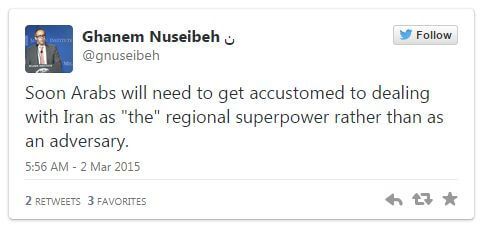
– Rep. Betty McCollum: Why I won’t be attending Netanyahu’s speech
– Sen. Jeanne Shaheen: Why I will attend Netanyahu’s speech
– Rep. Jan Schakowsky: An Israel supporter who won’t be at the prime minister’s speech
– Ex-Congressman Mike Rogers: Why we need to hear Netanyahu
– Richard Kemp: Netanyahu, Churchill and Congress
– Mort Zuckerman: For Netanyahu and Israel, an existential moment
– Yuli Edelstein: Netanyahu’s speech to Congress comes at right time, right place
– Michael Segall: A bad nuclear agreement will undermine Mideast stability
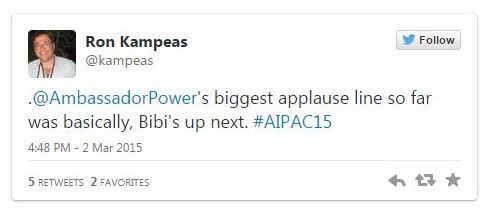
– William Kristol: Netanyahu’s moment
– Eugene Robinson: A necessary deal with Iran
– Tony Burman: Netanyahu, his pants on fire, brings torch to Washington
– Danny Danon: What Netanyahu will say about Iran
– Jackson Diehl: Netanyahu’s dicey political bet
– Christopher de Bellaigue: History won’t judge Bibi kindly for thwarting nuclear deal
– Steven Rosen: The real crisis in U.S.-Israel relations lies ahead
• See also the following staff-eds:
– Boston Herald: Listening to Netanyahu
– Chicago Sun-Times: Bipartisan supporters of Israel should skip Netanyahu speech
– Newark Star-Ledger: Let’s hope Netanyahu loses
• Anshel Pfeffer‘s take on this New York Times report.
• In commentaries on other issues (yes, there’s a whole world beyond proliferation, plutonium, polls, and politics) the Toronto Sun‘s Sue-Ann Levy’s not surprised Queers Against Israeli Apartheid is disbanding. The main takeaway is that ISIS did the group in.
Gay, Jewish activist and lawyer Martin Gladstone, who produced two documentaries at his own expense about QuAIA, figures with (ISIS-led) atrocities like beheadings, the rapes and the genocides of minorities happening before our eyes, QuAIA ended up looking “even more ridiculous” than they already were for viciously attacking “the only gay friendly pluralistic liberal democracy” in the Middle East.
• 7 ways universities can begin to challenge anti-Semitism on campus
• For more commentary/analysis, see Gregory Katz (Jihad John won’t have the same impact unmasked), and Hisham Melhem (The twilight of Middle Eastern Christianity).
Image: CC BY-NC-SA flickr/JJ Merlin; Madonna via Instagram/Madonna; Kerry via Flickr/US Dept. of State; cameraman CC BY-NC-ND flickr/Tim S
For more, see yesterday’s Israel Daily News Stream and join the IDNS on Facebook.

